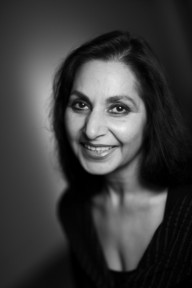Many many decades ago as a young girl in a small town, I remember reading a cover story on film maker, artist and writer Imtiaz Dharker with growing admiration. She was someone who had battled great odds to acquire personal and creative freedom. I wanted to grow up to be like her. A few years later, I found myself interviewing her as a rookie reporter and heard her voice in my head all the way back home. Amazed at how life sometimes delivers just what you never thought it would.
Almost 15 years later, I met her again. After both of us in a way had changed from the people we were when we first met. I could see that she had grown beyond a new set of limiting circumstances and become a richer, wiser, scarred but healed version of herself.
Her dark eyes had seen a lot but they still sparkled and meeting her made me aware just how we almost always meet the teachers we need to meet at certain key moments of our life.
What I learnt from her was that women must choose freedom to be who they are over fear, comfort, rule books and safety. She was a living proof of the fact that brave journeys if chosen mindfully can lead to pine scented orchards within. Her journey began in Lahore with her birth, found direction in Glasgow, Scotland and has come full circle in India. Today she feels at home everywhere in the world and speaks in the language of many cultures. And always, she speaks for and of the fragility of life that hangs like a basket of eggs above a stockpile of inflammable prejudices. She sketches her poems with both ink drawings and crystalline thoughts which for all their clarity have the warmth of a well-loved eiderdown.
The book I remember her for is The Terrorist At My Table (Penguin Poetry) which spoke about the perishability of culture and all its delicate nuances under the hammer of absolutism and terrorism, both State sponsored and individual. It is about what happens when the dots become more important than the big picture. It is about the instant when heaven fragrant with orange groves becomes a bloody hell because someone stamps his footprint on the earth and claims it as his while another picks up a fistful of earth and says it belongs to him. Through her work, she engages passionately in the human condition regardless of the baggage of politics, social, religious and moral conditioning we all carry with us.
She told me, “In the face of a world going mad, a small connection with another human being is enough to cut through stereo-types and hate. We are all subtle beings made up of so much more than can be summed up in just words. We are stronger when we open our doors to other people, cultures, ideas and when we feel confident enough as a nation and a culture to give freedom to different view points.’’
Reema Moudgil is the author of Perfect Eight (http://www.flipkart.com/perfect-eight-9380032870/p/itmdf87fpkhszfkb?pid=9789380032870&_l=A0vO9n9FWsBsMJKAKw47rw–&_r=dyRavyz2qKxOF7YucnhfXw–&ref=4fe1efd1-de20-4a30-8eb8-ef81a99cb01f







Wow! “…women must choose freedom to be who they are over fear, comfort, rule books and safety.” “brave journeys if chosen mindfully can lead to pine scented orchards within.” “like a basket of eggs above a stockpile of inflammable prejudices” Wow!